Thank you to the Whyte Museum of the Canadian Rockies for granting permission to the Park Warden Service Alumni to post this interview on our website.
Park Warden Alumni Society of Alberta Oral History Project Phase 8 – Summer/Fall 2019
Interview with Bill & Cheryl Walburger
Interviewed by Perry Davis
September, 2018
Lethbridge, Alberta.
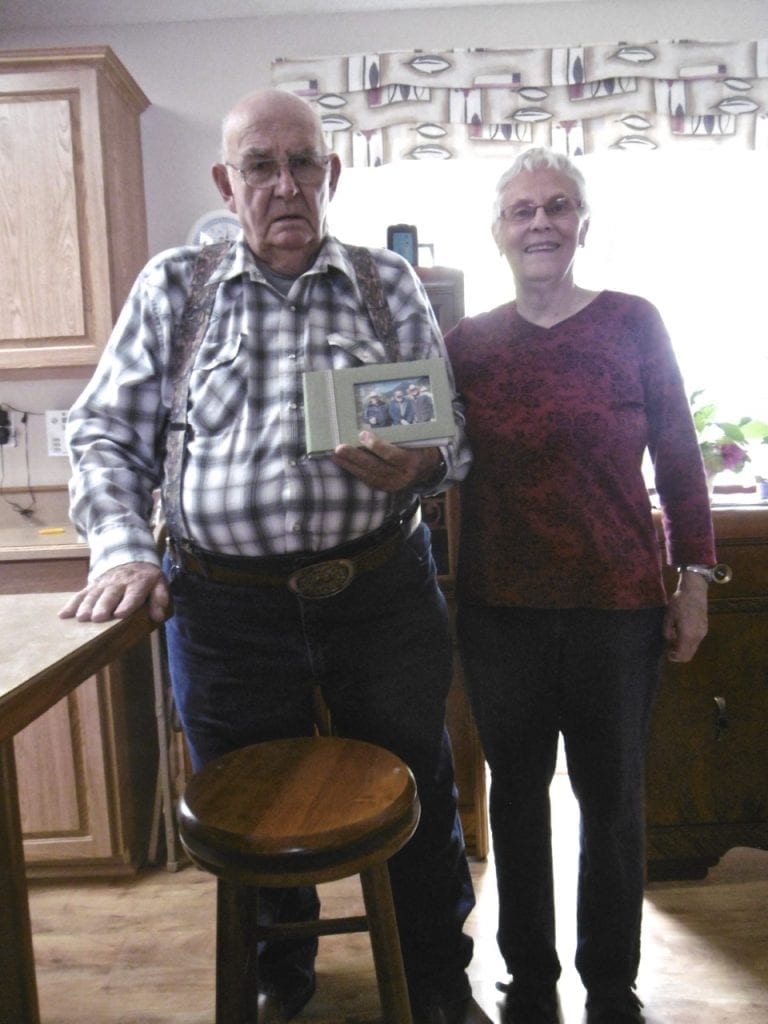
Bill & Cheryl Walburger September 2018
I took this photo of Cheryl and Bill before I left. Bill is displaying a photo of him with Alfie and Bob. Note the belt buckle!
Perry Davis
Place and Date of Birth: Bill was born in 1940 in Cardston, Alberta. His family lived at Leavitt, west of Cardson. Bill rode a horse to school for 7 years, a distance of 4.5 miles each way.
Occupations: As a youngster, Bill wanted to be a cowboy, a policeman and a fireman and wanted to operate heavy equipment. He managed to fulfill all of these ambitions starting with a job as a ranch hand, and then worked for Dave Simpson in Waterton Lakes at the pony barn. After working at the pony barn for 2 years, he was hired onto the Trail Crew for Waterton Lakes National Park where he worked from 1964 to 1966. In September of 1966 he moved to Jasper as a Park Warden. Bill worked in both the back-country and front-country of Jasper, then moved to Yoho Park in 1969 and finally Elk Island National Park in 1974. Bill left the parks service in 1981. He became a grader operator for 12 years and a Weed Inspector for Cardston County for 20 years.
Additional Information: From Silent Partners by Ann Dixon. When Bill was offered a position in Jasper National Park as a backcountry warden Cheryl had to adapt to a new environment, isolation and resourcefulness. She stated. “As I was a born and bred city girl this was going to be a real challenge for me, a life in the wilderness with none of the necessities I had grown up with and taken for granted.” Cheryl adapted well and faced the challenges of living in remote districts such as Blue Creek. At this time the Walburgers had a 2½ year old daughter Ione who rode with her dad on his saddle horse for the trip in to Blue Creek. Winters were especially difficult. Not having close neighbours was another matter. “We had an old crank forestry phone run by batteries. This was our lifeline in Jasper and it had to be kept operational at all times. Their son David was born just prior to their transfer to Yoho Park.
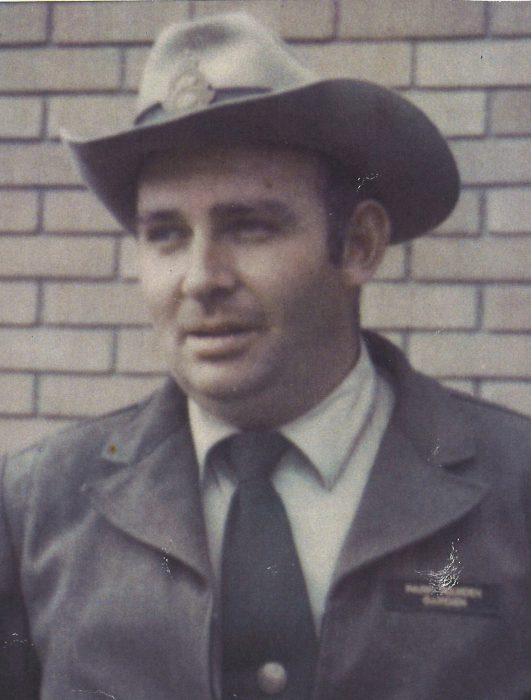
This interview was carried out by Perry Davis in the home of Bill and Cheryl Walburger in Lethbridge, Alberta in September of 2018.
Perry: “What did you want to be when you grew up, Bill?”
Bill: “When I was in grade 2 or 3 I wanted to be a cowboy; I wanted to be a policeman; I wanted to be a fireman; I wanted to run heavy equipment. What else? “I’ve done everything: I ran a grader for 12 years after I finished with Parks. Before I got on with Parks I worked on a ranch, the Stringham Ranch at Milk River. Right on the border of Cardston and Warner County and then it went to the U. S. border. 72 sections. I wanted to be a cowboy so I was a cowboy; I wanted to be a policeman so I was a park warden”.
Perry: As a warden you were a police officer.
Bill: “We were. In the park we had more authority than the mounties under the (National) Parks Act.
“I was trained up to a Fire Boss 1 in the Alberta Forest Service, Parks; law enforcement. When I was in the park I did that. I was a weed inspector for 10 years after I quit the park. So, that took in 22 years or so.”
Perry: “Where were you a weed Inspector?”
Bill: “Cardston County. Everything in the Canadian area to the U. S. border. Anyway, I did everything I wanted to do.”
Perry: “Where were you born and when?”
Bill: “ I was born in Cardston, Alberta, January 30, 1940.”
Perry: “Where did you grow up?”
Bill: “In Leavitt, just west of Cardston”
Cheryl: “It’s a small town… a hamlet.”
Bill: “You go to Cardston and then towards Mountainview. Leavitt is halfway in between.”
Cheryl: “You go right through Leavitt on the main road to Waterton”.
Bill: “There’s a guy (that has) got a welding truck right along the road. He’s got all kinds of sculptures.”
Perry: “So you wanted to be a warden, a fireman, a police officer – being a warden combines all of those. So how did you get started in the warden service?”
Bill: “I started about ’62. I worked for Dave Simpson in the pony barn in Waterton. I did that for two years. The first trip I went on was up the head of the northwest branch of the Old Man River. I was out for 23 days with 23 people from Connecticut. One of them was a lawyer and one of the others was a pediatrician. The lawyer, Belton Copp, bought land at Twin Butte he liked this country so much. When I came back from that trip Dave liked me so much he fired one of the hands they had; they had to give me a job at the pony barn in Waterton Lakes National Park (W.L.N.P.).”
Bill: “When I was on the trail crew in Waterton we raked the trails with a fire rake from the townsite to the lake. You could take your wife on her wedding day with her wedding dress or pushing a baby carriage in her high heeled shoes and not snag her dress.”
Cheryl: “They were perfectly groomed.”
Bill: “That was in ‘64 at W.L.N.P. ‘til I got on the Clean-up Crew. We took a trail cat, put a 4-foot dozer on it, and went over every trail in the park except the top end of Crypt with its switchbacks. I have been up to Crypt Lake and Carthew Summit a zillion times on horses; now they don’t let you take horses up there.”
Cheryl: “Bill has been on every trail in the park on horses.”
Bill: “We were in charge of trails. There was probably 10 of us. We’d take a truck out, four-wheel-drive, go to the start of the trail, rake it up, rake it back, put in culverts, dress down the sides of the trail so that nothing was hanging out. And now you can’t even find a trail in Waterton because they’re such a mess. Take Jasper, the North Boundary – such a disgrace. They actually want guys to come out, ride trails and open them for the wardens.”
Perry: “When the Warden Alumni was formed that’s exactly what we offered to do. We wanted to volunteer. Our offer wasn’t accepted.” “Someone who knows you from Yoho is Scott Ward.”
Cheryl: “They (the Warden Band) were singing at Waterton. We were there. They were singing one of the warden songs. We were coming down to where they were singing and Scott says, ‘Here comes one of the old ones now.’ ”
Bill: “Everybody I trained when I was in the warden service, they are all retired now. Donnie (Mickle) was the barn boss then. Terry (Willis) is awfully close (to retirement). He was in Yoho for years. Saskatchewan crossing – what’s his name?”
Cheryl: “Harold Abbott. He’s retired. In Vernon.”
Bill: “An intelligent man in the new warden service but from the old one. He worked for me in Elk Island. Years ago I got in with the old guys and got to know them.”
Perry: “But then you became ‘the old guy.’ That’s how Scott remembers you. You were training the next generation, you might say.”
Bill: “They are all gone now. Randall Schwanke; he was in Waterton; trained way up in fire with the provincial government. Originally from Lamont and stationed in Waterton for years. In Elk Island with me was the supercop – Bruce McGuinness.”
Perry: “The supercop I remember was Duane Martin.”
Cheryl: (laughing) “We know Duane.”
Bill: “Not like Bruce. Duane was civilized. Bruce could….someone was speeding going out of Waterton; he chased him halfway to Pine Ridge, got him stopped. The guy was drunk, tore Bruce’s pant legs, ripped his jacket….”
Perry: “They got in a fight?”
Bill: “Oh yeah! He got him handcuffed and took him in. He was my supercop.”
Cheryl: “Wasn’t he going to give someone in Elk Island a ticket for a picnic or something?”
Bill: “He charged them for killing a skunk in the campground. Went to court. The kids were drunk and killed the skunk with a piece of firewood. The guys complained and Bruce was on duty. He charged them with killing wildlife. You can imagine the laugh he got when he got in court. The kid got five dollars taken out of him.”
Cheryl: “This is a picture of Harry Abbott. It was taken at Gordon Rutherford’s retirement party. We took Ann Dixon there.”
Perry: “Was there formal warden training at that time?”
Bill: “If you could shoot a rifle, pack a horse, you had a job.”
Cheryl: “He knew how to be a cowboy.”
Perry: “That was exactly what they were looking for then.”
Bill: “When we got in they taught us the stuff they wanted us to do.”
Perry: “The next generation was sent off to take courses in the natural sciences. Things were changing.”
Bill: “John Turnbull – when his father–in–law died he went to Saskatchewan and ran a big horse ranch. He didn’t like it so he came back to be on the warden service. He had quite a few years in Pocahontas but he had to come and take that course before he could get on.”
Perry: “There was a Turnbull who was regional director.”
Bill: “It wasn’t him.”
Perry: “Besides Waterton, what other parks did you work in, Bill?”
Bill: “ ’66, in Jasper. That’s when I started off as a park warden; September ‘66. Then we went to Yoho.”
Cheryl: “1969; then Elk Island, 1974.”
Perry: “Always avoiding Banff?”
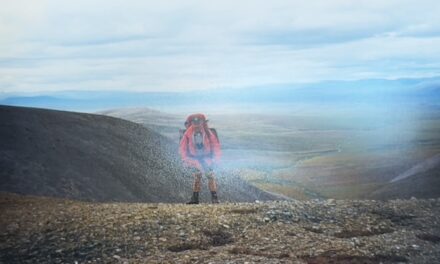
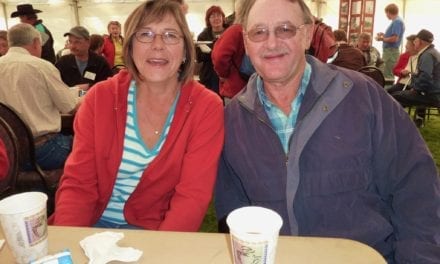
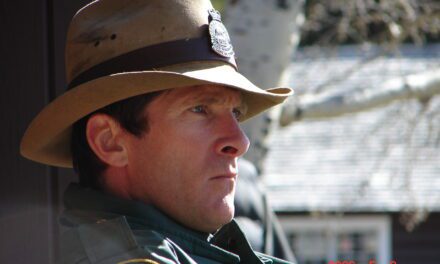
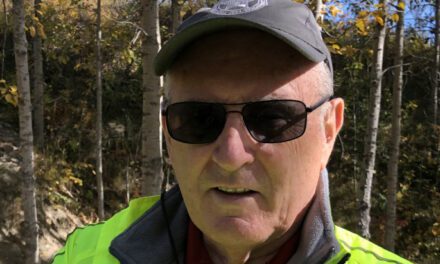
Bill was the first person I worked for when I became a warden in Yoho. But that was only for two weeks before I went to Waterton.
Great writing.
Bill was my mentor and District Warden I worked under in Yoho as a seasonal warden.
Summer of 1973 & 1974.
He was a great person.
Got to meet with him and Cheryl one evening in Magrath.
It had been almost 40 years since we had seen one another.
Called him up on the phone and this some what the way the call went,
” Hello is this Bill walburger?”
“I was when I woke up this morning.”
I introduced myself as a voice from past and spend a couple hours visiting with them.
Miss Bill, he was the real thing.
I only stayed in the warden service as a seasonal from 1972 > 1975.
There was nobody like the originals Hal Shepard Jack Woledge, Gord Rutherford, Dale Portman, Gordon Peyto, etc.
NOTE:E-mail julianrichaud@hotmail.com